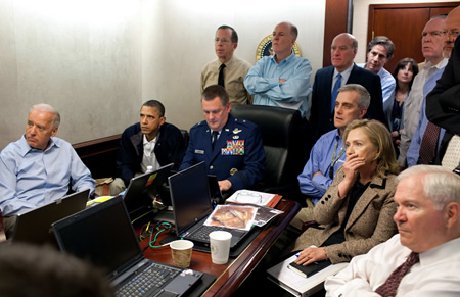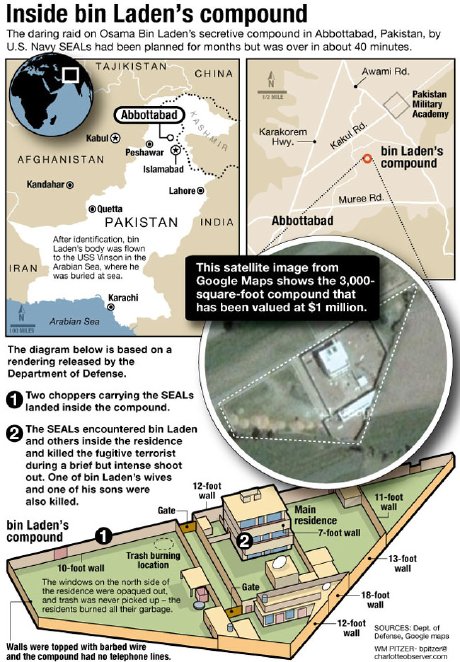Adil Najam
What do Pakistanis think about how Osama Bin Laden met his end, the implications of that end?
There are as many opinions on what happened in Abbottabad as there are Pakistanis. Maybe more. But there is no sense whatsoever where the government of Pakistan (or any of its major institutions) stand on what happened – or stood when it was happening. For 36 hours now the world has been waiting to see what Pakistan does and says – the silence and incoherence from Islamabad has not just been embarrassing, it has been damning. Finally, key institutions in Pakistan have begun trying to piece a narrative together – unfortunately it is way too late and the narrative itself rather lame.
When I put up a short post on Osama Bin Laden’s death soon after the news broke, I had hoped that in time more details would become available and we would get more clarity on what happened and how. We do now have more detail. But certainly not more clarity. The story about what happened in Abbottabad now lives in Spin-abad. Everyone – from governments, secret agencies, the media, the Twitterati, and your spinster aunt – are taking a spin. Many are taking multiple, sometimes contradictory, spins. Everyone except the Pakistan government.
That, of course, is a surprise – not only because the Pakistan government does have a lot of explaining to do, but even more because it is in the interest of the Pakistan government to do that explaining itself rather than have someone else do it for them. Yet, up until it was already too late, Pakistan seems to have abdicated that responsibility. In fact, President Barack Obama, Secretary Hillary Clinton and Senator John Kerry seemed to be making that (half-hearted) case for Pakistan more than anyone in authority in Pakistan. Given that President Obama had informed President Zardari before the speech from the US President, one would have assumed that the Pakistan President and his media handlers would have their own statement ready to go on the air minutes, if not seconds, after President Obama’s speech. This is not about spin and PR, this is Diplomacy 101: Own and define the narrative as soon and as clearly as you can before someone else defines it for you – especially if the narrative is likely to be unfavorable.
But the narrative, itself, is not the core of Pakistan’s challenges. The problem is the facts on the ground and the government’s inability and unwillingness to explain them. Pakistan is used to the feeling of the world ganging up on it. But there are good reasons for the questions being asked of Pakistan by the world today. There are even better reasons for the questions being asked of Pakistan by Pakistanis today. Whether the government comes clean to the world or not, it is vital that it respond to Pakistanis. The first is a matter of national image (no trivial issue, that), but the latter is a question of citizen trust in national institutions (an existential element of statehood).
The fact is that there is a Pakistan case to be made on this issue. And it needs to be made to Pakistanis much more than to the rest of the world. It is a case that forcefully stresses that a world, and a Pakistan, without Osama Bin Laden in it is a vastly better world than one with him in it – this is a villain who orchestrated events that have left more than 30,000 Pakistanis dead in extremism and terrorism. It is a case that legitimately highlights the sacrifices that Pakistan and Pakistanis have, in fact, made in the fight against terrorism. Most importantly, it is a case that honestly analyzes what happened in Abbottabad – it is not a surprise that Osama Bin Laden was found in Pakistan and in a large urban area (just like nearly every other major Al Qaida figure captured) – but an explanation is owed on why Pakistani intelligence failed to make the connections that led to him, an explanation is owed on exactly what Pakistan’s official role in the final operation was (or was not), and an explanation is owed on exactly what Pakistan’s strategy on countering terrorism is, who is running it, and why it is not working well enough or fast enough.
In a country and an ‘establishment’ as divided as Pakistan, this cannot be an easy conversation; it is not supposed to be. It is time to ask honest and tough questions of everyone. It has long need a necessary conversation; now is the time to have it.






















































@auk: It is not unusual or unexpected that many people don’t believe that OBL was killed in Abbottabad. People usually tend to believe or seek information that is consistent with their own views. If not, they reject it or distort it to make it conform to their views.
If one goes back into history, many people didn’t believe for quite sometime that Hitler was killed in his bunker. More recently, many people didn’t believe Jaranail Singh Bhindranwala was killed in the storming of the Golden Temple. And, many people, including in America, did not believe that man had landed on the moon. This is true of OBL’s death, too. However, what is amusing though is that those in Pakistan who don’t believe OBL was killed in Abbottabad are also offering ghaaebana funeral prayers him. How illogical!
My intuition tells me that OBL is already savoring the various delights in jannat (or is it Jannah?)
But, as also pointed out in this post, the place and manner of OBL’s death raises many legitimate questions. We will need to find satisfactory answers to them.
Do the Americans realize how their inability to release pictures and haste in having the body disappear at sea is quickly eroding some faith in what say has happened.
I am not one for conspiracy theories, but I second the thoughts expressed by some about the Americans’ claims, considering how the whole post operation frenzy is handled. Why was the body released in sea with such haste? What’s this obsession with the last rites for the most wanted man on earth? The body like so many others before him could have been brought to the US and kept for any future forensic analysis. As for releasing pictures of the body, frankly I can now release a (doctored) photo of OBLs dead body. I question this because in the last 10 years or so since Tora Bora, there is not one solid proof of OBL being alive. At that time it was claimed that he had kidney disease and was on dialysis. If we believe that, then the chance of him surviving for 10 years while on the run are minimal at best. Secondly I don’t remember one authentic audio of him coming out since. The few messages that were released were generic at best, without mentioning any specific events, and hence could have been recorded at any time in the past. Lastly, it is very easy for Pakistan to prove that it was OBL who actually died there. There is blood all over the place, and one of the blood samples (as claimed) is his. We can use that blood to match the DNA with that of the family members. Unless corroborated by more than one source, it seems unlikely that it was him.
Opportunity to transform Pakistan
‘We didn’t know’ if this is what the ‘most feared’ agencies and army telling than god bless Pakistan. We were told time and again in fact at least 4 times in the short history of Pakistan that only army could save Pakistan. We were programmed to sing songs for them…now we know that they are responsible for destroying Pakistan with their adventures and lust for power but also are quite inept when it comes spying and intelligence gathering.
I heard the speech of general Kiyani the other day…he was talking about sacrifices and national pride… I think it should start from there. If you compare the life style of our retired generals with Indians and even with Americans, you find that these guys are in for money and not for any honor.
Time has come for Pakistan to repurpose resources from military so maybe we can really stand up. Here is an opportunity to make Pakistan whole. At this time we are closer to Somalia than Indonesia. We are standing at the crossroad of history. Great nations are made by people and not by dictate. Look at what is happening in Indonesia, Turkey and other countries; they were all run by military dictators at some point. Look at them now; they are functional democracies and thriving. So it is possible to transform Pakistan into a decent civilized society.
The Worst civilian government is better than a dictator for a simple fact that you can potentially throw them out.
@ Beena on page 2: I guess you are looking at the picture through Pakistani glasses.
This picture was on the front page of The New York Times yesterday. The White House team is watching the live images transmitted from Abbottabad, from the operation site, to the White House via the CIA Director’s office in Virginia, using a technology that most of us don’t understand. The officer sitting in the middle, or “at the head”, as you say, is operating the projection system. If you look carefully, the number one man in the US armed forces, Mike Mullen, is standing in the back, behind the president. The US generals know their place. Those who don’t are shown the door. Remember General McChrystal ?